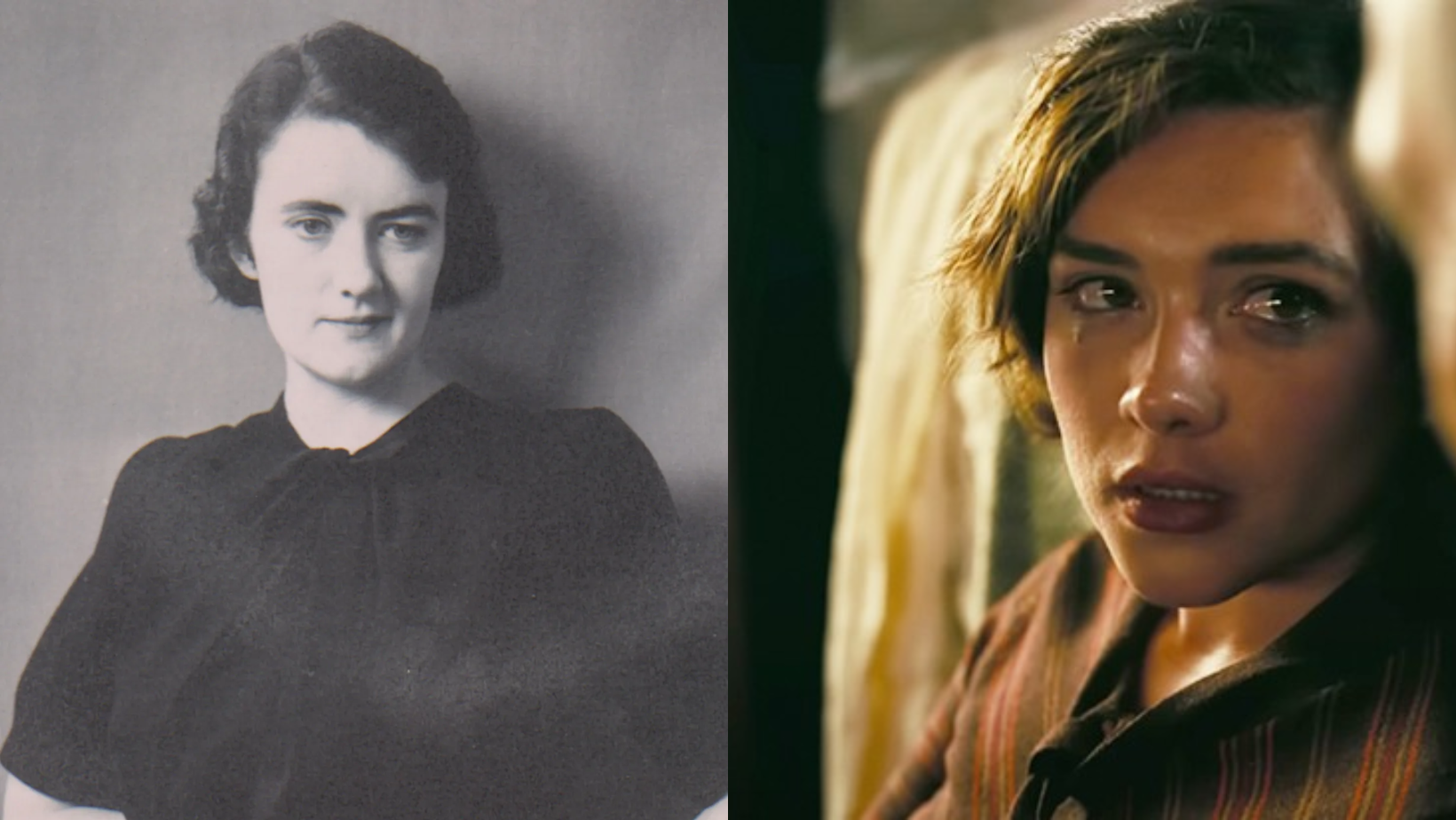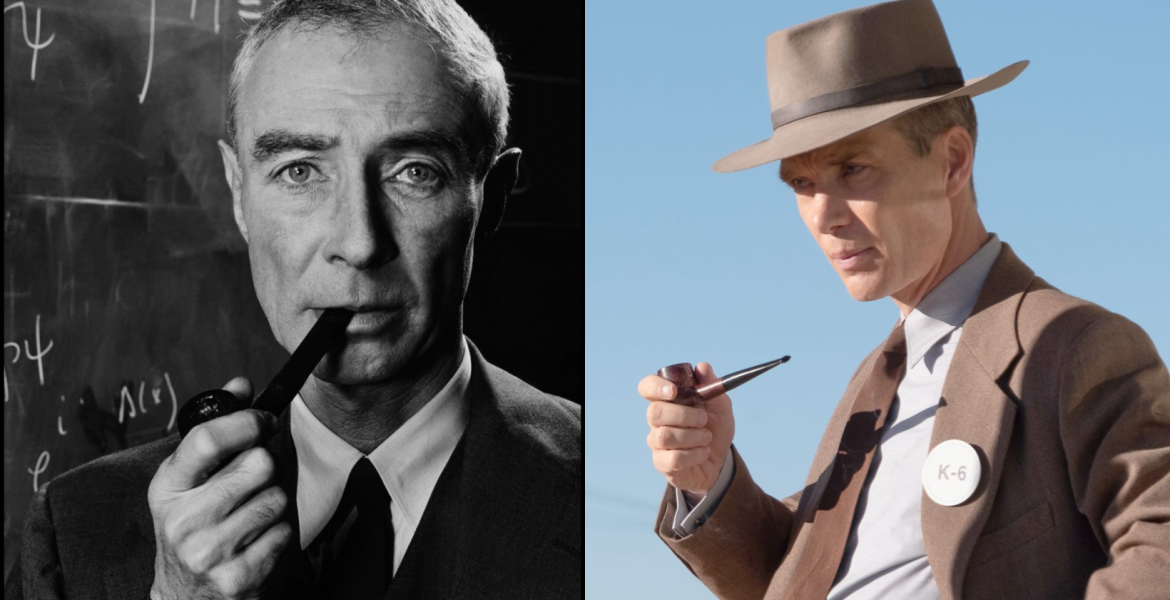The much-awaited Christopher Nolan magnum opus Oppenheimer is finally in cinemas, and of course, people might wonder how much of it is actually based on a true story. The following article will detail the film’s seamless mash of facts with fiction (mostly facts) and tell you about what point Nolan has taken up to represent in his espionage thriller and what he leaves out.
What is the movie about?
“Oppenheimer” delves deep into the life of J. Robert Oppenheimer, the brilliant American theoretical physicist, and explores the pivotal moment in history when he led the invention of the atomic bomb. The movie centers around the events leading up to the infamous Trinity Test, which took place on July 16, 1945, in the Jornada del Muerto desert of New Mexico.
This story provides an intimate portrayal of Oppenheimer, a man driven by grandiose ambition and conflicted genius. As the lead scientist of the Manhattan Project, he faces the immense responsibility of creating a weapon with unimaginable destructive power.
The narrative explores the moral dilemmas and haunting guilt that accompany Oppenheimer as he wrestles with the implications of his work. Set against the backdrop of World War II, the film sheds light on the immense pressure and anxieties felt by the genius and his team during the development of the atomic bomb. Inadvertently, the movie confronts the audience with the lasting consequences of the Trinity Test and its role in propelling humanity into a frightening era of nuclear arms race, a shadow that still looms over the world today.
Is ‘Oppenheimer’ based on a true story?
Yes. Christopher Nolan’s Oppenheimer is indeed based on a true story. This version of the history delves into the extraordinary life of J. Robert Oppenheimer and his relentless pursuit to develop the world’s first atomic bomb.
This is a significant departure for Nolan himself, who ventures into the realm of biographical storytelling, though it’s worth noting that he once came tantalizingly close to crafting a Howard Hughes film starring the gifted Jim Carrey back in the early 2000s.
However, if we are being absolutely accurate, the genesis of Oppenheimer can be traced back to the Pulitzer Prize-winning book, “American Prometheus: The Triumph and Tragedy of J. Robert Oppenheimer,” penned by the brilliant minds of Kai Bird and Martin J. Sherwin. As is the book itself, Nolan’s narrative also majorly and expertly weaves together the triumphs and tribulations of this enigmatic figure, revealing the complex tapestry of his life and the far-reaching consequences of his groundbreaking scientific endeavors.
Who was J. Robert Oppenheimer?
Robert Oppenheimer was a prominent theoretical physicist whose work played a pivotal role in the development of the atomic bomb during World War II. Born on April 22, 1904, in New York City, he demonstrated exceptional intellectual abilities from a young age and quickly rose to become one of the United States’ most highly regarded physicists during the 1920s and 1930s.
In 1942, Oppenheimer was recruited to join the top-secret Manhattan Project, a government-led effort to develop the world’s first nuclear weapons. Due to his leadership abilities and scientific expertise, he was appointed as the director of the Los Alamos Laboratory in New Mexico, which was the main research facility for the project. Under his guidance, a team of accomplished scientists worked tirelessly to build the atomic bomb.
On July 16, 1945, the culmination of their efforts came to fruition with the successful test of the first atomic bomb, codenamed “Trinity,” in the Jornada del Muerto desert in New Mexico. The detonation, with a force equivalent to 21 kilotonnes of TNT, was a massive and historically significant event, marking the birth of nuclear weapons.
The atomic bombings of Hiroshima and Nagasaki in Japan followed soon after, in August 1945, and these actions remain the only use of nuclear weapons in an armed conflict. While Oppenheimer was not directly involved in the decision to use the bombs, he did lead the team responsible for their creation. Throughout the rest of his life, he appeared to struggle with the ethical implications of his work and the destructive power of the weapons he helped develop.
In 1947, Oppenheimer became the director of the prestigious Institute for Advanced Study in Princeton, New Jersey, where he continued his research and contributed to academic discussions on nuclear power and international control of atomic energy. He was an advocate for preventing nuclear proliferation and a nuclear arms race with the Soviet Union.
However, his political views and past associations with individuals and organizations linked to the Communist Party USA became a source of controversy during the Second Red Scare in the early 1950s. This ultimately led to a security hearing in 1954, during which his security clearance was revoked, effectively ending his access to government atomic secrets and his career as a nuclear physicist. Nolan’s film mostly leads up to this point and doesn’t show us that despite this setback, Oppenheimer remained active in academia and continued to lecture, write, and contribute to the field of physics.
In 1963, he received the Enrico Fermi Award as a gesture of political rehabilitation, acknowledging his contributions to science and the complicated circumstances surrounding his past. Additionally, in a noteworthy development in 2022, the U.S. government vacated its 1954 decision to revoke Oppenheimer’s security clearance, acknowledging flaws in the process.
What does the movie not show about Oppenheimer’s early life?
Robert Oppenheimer’s upbringing shaped the views he held throughout his life, even though his childhood is not portrayed on screen in Nolan’s film. Born in 1904 into a wealthy secular Jewish family in New York City, Oppenheimer received his education at Manhattan’s Ethical Culture School, graduating in 1921. Despite his parents being first- and second-generation Americans of German-Jewish descent, Oppenheimer distanced himself from fully embracing his heritage for a considerable portion of his life.
While he rejected the labels of being solely German or Jewish, the outside world often perceived him as a German Jew, which had a profound impact on his interactions with the world. Throughout his time at Harvard, he faced the harsh realities of antisemitism, which only intensified as the Nazis rose to power in Germany. Witnessing the mistreatment of Jews in Germany ignited a deep, smoldering anger within him, motivating him to take action.
This sentiment was evident during his 1954 hearing before the United States Atomic Energy Commission, a crucial element of the movie’s central narrative. He passionately spoke about his fury towards the treatment of Jews in Germany and disclosed that he had relatives there. Oppenheimer’s dedication to his Jewish identity compelled him to assist in rescuing his relatives from the oppressive regime and bringing them to safety in the United States.
What was Oppenheimer’s relationship like with Jean Tatlock?

In 1936, J. Robert Oppenheimer found himself entangled in a tumultuous relationship with Jean Tatlock, a 22-year-old Stanford Medical School student and member of the Communist Party. Despite their age difference, the pair became involved in a passionate connection that sparked Oppenheimer’s interest in left-wing political causes. Throughout their time together, Oppenheimer actively supported anti-fascist efforts during the Spanish Civil War and championed the unionization of academics.
However, their romantic relationship eventually came to an end in 1939 while Oppenheimer was still married to biologist Kitty Puening. Despite the official breakup, he continued to maintain contact with Tatlock and even visited her in San Francisco, where she worked as a pediatric psychiatrist at Mount Zion Hospital as late as 1943.
Tragically, nearly seven months after their final meeting in June 1943, Tatlock’s life came to a devastating end. Her father discovered her lifeless body in her apartment on January 4, 1944. At only 29 years old, Tatlock had battled clinical depression, and her death was ruled as a suicide. However, suspicions arose due to her past association with communist politics and her relationship with Oppenheimer, leading some to speculate about the possibility of foul play.
The FBI had placed Tatlock under surveillance because of her political ties, which added to the complexity of her story. Despite the speculation surrounding her death, the true circumstances remain a subject of debate and uncertainty.
Was Oppenheimer a communist?
While J. Robert Oppenheimer never formally joined the Communist Party, the movie highlights that many of his closest friends and family members, including his brother Frank Oppenheimer, friend Haakon Chevalier, and wife Katharine “Kitty” Puening, were affiliated with the party at various points in time.
Throughout the film, it becomes evident that the U.S. government was aware of Oppenheimer’s communist associations early on, but they chose to overlook them during the critical Manhattan Project, recognizing his unparalleled scientific expertise and leadership as vital to the mission’s success. Despite initial skepticism, Oppenheimer was deemed the right person for the job, and his contributions to building the atomic bomb were unparalleled.
However, as the movie unfolds, it becomes clear that Oppenheimer’s communist connections would later come back to haunt him during the height of American anti-Communist hysteria in the 1950s. The political climate became increasingly hostile, with suspicion and fear driving government actions. Oppenheimer’s past associations, coupled with his outspoken stance against developing the hydrogen bomb, made him a target for scrutiny.
The film explores the turn of events as Oppenheimer faces a security hearing in 1954, during which his security clearance is revoked, effectively ending his access to sensitive government information and his career as a nuclear physicist. The fallout from the hearing reflects the impact of the Red Scare on individuals, even those who had played instrumental roles in shaping history.
What became of Oppenheimer’s life after the AEC hearing?
The aftermath of the security hearing had a profound impact on J. Robert Oppenheimer, defining the course of his life. His close friend and fellow physicist, Isidor Isaac Rabi, expressed deep sorrow over the injustice inflicted upon Oppenheimer, a man known for his pursuit of peace and scientific brilliance. Rabi lamented that a small, mean-spirited group had managed to destroy a man of such immense integrity and contributions.
Despite the adversity he faced, Oppenheimer continued to serve as the director of the Institute for Advanced Study until 1966, demonstrating his resilience and commitment to advancing scientific knowledge. However, his health began to decline, and he succumbed to throat cancer at his Princeton home on February 18, 1967, leaving behind a legacy that extended far beyond the boundaries of the Manhattan Project.
In a poignant moment captured in the film’s final scene, Oppenheimer is shown receiving the Enrico Fermi Award in 1966, the highest honor bestowed by the Atomic Energy Commission. President Lyndon B. Johnson himself presented the award, recognizing Oppenheimer’s invaluable contributions to science and humanity.
In his acceptance speech, Oppenheimer eloquently referred to Thomas Jefferson’s eloquent words on the brotherly spirit of science. He candidly acknowledged that the scientific community had not always lived up to this ideal, but emphasized the vital common interests shared by countless men and women engaged in the great enterprise of their time. Oppenheimer passionately expressed the belief that humanity’s path lay in preserving and enriching life, liberty, and the pursuit of happiness, while moving away from war as the determinant of history.


